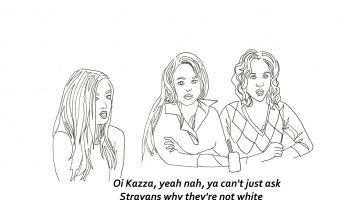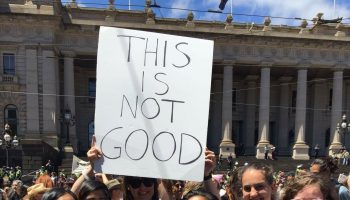“If you don’t love it, leave”. This message, plastered across the image of a bold Australian flag was sold on a men’s singlet in a Woolworths in 2014. Tasmanian MP Jacqui Lambi, reciting the Oath of Allegiance and dressed in a sequined Australian flag dress, expressed that same message. It was also stated by Neil El-Kadomi, a prominent Mosque chairman, after a 15 year old radicalized by Islamic extremists shot a man outside a Parramatta police station. While the motivations behind the sentiment may differ, the implication remains the same: those who seek to rectify and criticize issues within Australian society essentially have less of a right to be here.
The fervour and rituals involved in many displays of patriotism seem almost religious in nature. Sing the national anthem, put your hand over your heart, pledge your allegiance. As a citizen, there is a social obligation to partake, with enthusiasm, in the rites of patriotism that is akin to the expectations of a church’s congregation. As so many who have attempted to reform religious institutions have been excommunicated from their communities, the disenfranchised public are told to ‘leave’ their homelands. A true patriot feels unquestioning affection and pride for their country and its perceived culture and ideology. Through patriotism, the successes of a country are emphasized, and its failures overlooked. But as ‘patriotic’ Australians, what do we have to be so proud of?
Many argue that patriotism benefits Australian society by brining people together through a shared cultural experience and sense of national identity. But the emotions of identity shouldn’t disallow the progress and tolerance that is a fundamental principle of democracy. Like many Western nations, we pride ourselves on the supposed ‘freedoms’ and rights that are allowed to our people. The notion that the rights of all Australians are upheld and protected brazenly disregards the experience of impoverished Aboriginal communities, members of the LGBT community who are not allowed equal rights to their heterosexual counterparts, and the indefinite detention of asylum seekers that we are morally and legally responsible for.
In a display of clothing based ignorance similar to that of Woolworths, Aldi withdrew its Australia Day inspired t-shirt design which stated “Australia Established 1788” in January of 2014. It is painfully ironic that one of the groups most marginalized and excluded by widespread Australian patriotism is our country’s indigenous people. The mere fact that our nationally acknowledged day of celebration marks the day of the invasion of their sovereign land demonstrates the insensitivity and callousness of white Australia’s attitude towards the rights and interests of our indigenous population. It is not enough to apologize, to obligatorily recognize the traditional owners of the land at the start of a school assembly, or to play a special game of football every year and call it ‘Dreamtime at the G’. How can we, the children of immigrants and colonizers, call ourselves proud Australians, until we ensure that the children of the rightful owners of this land, have equal access to the opportunities and privileges that we possess?
While contemporary displays of patriotism more often involve drunkenly waving an Australian flag while drinking a VB than dying for one’s country, the politics of patriotism is still just as much at play. Leo Tolstoy famously wrote in his essay ‘Patriotism & Government’ that “patriotism as a feeling is bad and harmful, and as a doctrine is stupid”. The xenophobic ideals that plague Australian society are informed by feelings of patriotism and national superiority, which have the capacity to exclude and marginalize groups perceived as ‘other’. The patriotic view that not only is our country and its way of life great, but superior to that of others, contributes to an environment of racial and cultural tension which dangerously mitigates our empathy for those who are not like us.
It is not a sense of patriotic duty that implores Australians to help their countrymen in times of need, but human compassion. That duty extends beyond the people who live in the same country as you, or who share your skin colour, your religion, or your political beliefs. Within recent years, this discussion has been brought to the forefront of societal discourse with the refugee crisis. The scare tactics of the Abbott government as well as media outlets such as the Herald Sun misinformed and manipulated the general public into a false sense that the Australian ‘way of life’ was under threat. Supposedly our shores are being inundated by fearsome Muslim ‘boat people’ who seek to abuse our women and impose Sharia Law in Australia.
As our own national anthem states, “for those who’ve come across the seas, we’ve boundless plains to share”. This is a lesson that the leaders of our country, as well as its general population need to learn. Maybe we should start singing the second verse more often.


